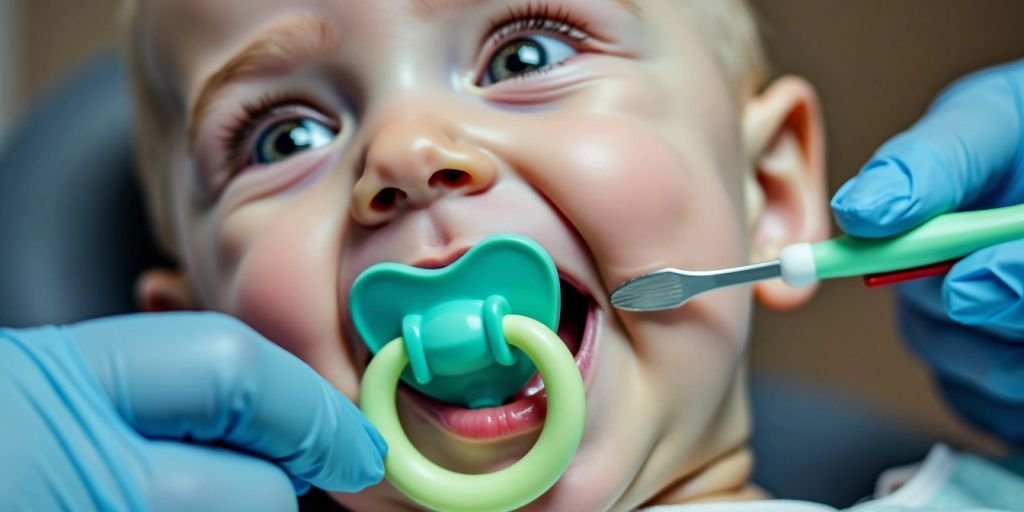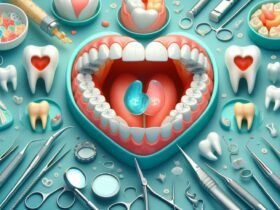Table of Contents
Pacifiers are a common tool for soothing fussy babies, but many parents wonder if they can affect their child’s teeth. While pacifiers can provide comfort and even reduce the risk of sudden infant death syndrome (SIDS), they also have some drawbacks, especially when used for too long. Understanding the impact of pacifiers on dental health can help parents make informed decisions about their use.
Key Takeaways
Understanding the Impact of Pacifiers on Dental Health
Pacifiers are a common tool used by parents to soothe their infants. However, their use can have both positive and negative effects on a child’s dental health. Understanding these impacts is crucial for making informed decisions about pacifier use.
How Pacifiers Can Affect Teeth Alignment
Regular use of pacifiers can potentially impact the growth of a child’s teeth or jaw. This can lead to misalignment issues such as open bites or crossbites. The longer a child uses a pacifier, the higher the risk of these dental problems.
Potential Changes to the Roof of the Mouth
Prolonged pacifier use can also cause changes in the shape of the roof of the mouth. The constant presence of a pacifier can prevent proper growth and development, leading to long-term dental issues.
The Role of Pacifiers in Oral Development
While pacifiers can help soothe a fussy baby, they can also interfere with the natural development of the mouth and teeth. It’s important to monitor and limit pacifier use to ensure it doesn’t negatively affect oral development.
Pacifiers can be a double-edged sword: they provide comfort but can also lead to dental issues if used for too long.
Positive Aspects of Pacifier Use

Pacifiers as a Source of Comfort
Pacifiers can be a great way to soothe a fussy baby. Many parents find that a pacifier helps calm their child, making it easier for the baby to fall asleep. This can be especially helpful at night or in public places.
Reducing the Risk of Sudden Infant Death Syndrome
One of the most significant benefits of pacifiers is their link to a lower risk of Sudden Infant Death Syndrome (SIDS). Experts, including the American Academy of Pediatrics, recommend using pacifiers during naps and bedtime. Babies with pacifiers tend to sleep less deeply, making them easier to wake up if needed.
Pacifiers vs. Thumb Sucking
When it comes to choosing between pacifiers and thumb sucking, pacifiers are often the better option. Unlike thumb sucking, you can control when and how often your child uses a pacifier. This makes it easier to wean them off when the time comes.
Pacifiers offer a simple way to comfort your baby and can even help reduce the risk of SIDS. However, it’s essential to use them wisely to avoid potential dental issues later on.
Negative Effects of Prolonged Pacifier Use

Misalignment and Bite Issues
Prolonged use of pacifiers can lead to misaligned bites. This includes open bites, overbites, buck teeth, and crossbites. When a child uses a pacifier for an extended period, their teeth may move from their original position to make room for the pacifier. This is especially common in children who continue using pacifiers beyond the age of two.
Increased Risk of Ear Infections
Using a pacifier for too long can also increase the risk of ear infections. The act of sucking can cause changes in the pressure in the ear, which may lead to infections. Parents should be aware of this risk, especially if their child frequently suffers from ear infections.
Potential for Speech Impediments
Extended pacifier use can also affect a child’s speech development. Children who use pacifiers for a long time may have trouble pronouncing certain sounds or words. This can lead to speech impediments that might require professional intervention to correct.
It’s important to monitor your child’s pacifier use to prevent these potential issues. If you notice any changes in their teeth or speech, consult a pediatric dentist for advice.
Preventing Dental Problems from Pacifier Use
Tips for Safe Pacifier Use
To avoid dental issues, follow these tips:
Choosing the Right Pacifier
Selecting the right pacifier can make a big difference. Look for these features:
When to Wean Off the Pacifier
It’s generally recommended that children stop using pacifiers by the age of four to reduce the risk of developing teeth from pacifier. Ideally, you should start weaning by age two. Here are some tips:
- 1. Gradually reduce pacifier use over time.
- 2. Offer other comfort items like a soft toy or blanket.
- 3. Praise your child for not using the pacifier.
Early weaning can help prevent long-term dental issues and reduce the risk of needing orthodontic treatment later.
By following these guidelines, you can help ensure your child’s dental health while still providing the comfort they need.
Common Dental Issues Linked to Pacifiers
Open Bite and Buck Teeth
One of the most common problems from pacifier use is an open bite. This happens when the top and bottom front teeth don’t meet when the mouth is closed. Buck teeth, or protruding front teeth, can also occur. These issues are more likely if a child uses a pacifier for a long time.
Crossbites and Other Misalignments
Pacifiers can lead to a crossbite, where the upper teeth sit inside the lower teeth. This happens because the pacifier can alter the growth of the mouth. Other misalignments, like overbites, can also develop.
Impact on Permanent Teeth
Prolonged pacifier use can affect the development of permanent teeth. The constant pressure can cause teeth to move out of place, leading to long-term dental issues.
It’s important to monitor your child’s pacifier use to prevent these dental problems. Early intervention can help avoid more serious issues later on.
Consulting with Dental Professionals

When to Seek Advice from a Pediatric Dentist
If you’re worried about your child’s pacifier habits, it’s a good idea to talk to a pediatric dentist. They can check for any early signs of dental issues and give you advice on what to do next. It’s important to catch problems early to avoid more serious issues later on.
Orthodontic Solutions for Pacifier-Induced Issues
Sometimes, using a pacifier for too long can cause problems like misaligned teeth or a narrow dental arch. An orthodontist can help fix these issues with treatments like braces or other devices. They will create a plan to correct the alignment and ensure your child’s teeth grow properly.
Long-term Dental Care Strategies
To keep your child’s teeth healthy in the long run, regular dental check-ups are essential. Your dentist can provide tips on good oral hygiene and help you decide when it’s time to stop using the pacifier. They can also monitor for any long-term effects and suggest treatments if needed.
Regular visits to the dentist can help catch and treat issues early, ensuring your child’s smile stays healthy and bright.
Conclusion
In summary, pacifiers can be both helpful and harmful for your child. They offer comfort and can even reduce the risk of sudden infant death syndrome. However, using them for too long can lead to dental problems like misaligned teeth and changes in the shape of the mouth. To keep your child’s teeth healthy, it’s best to limit pacifier use to when they are falling asleep and to stop using it by age two. Always keep the pacifier clean and choose the right size for your child. If you have concerns, talk to your dentist for more advice.
Frequently Asked Questions
How do pacifiers affect a baby’s teeth?
Using pacifiers can be helpful in infancy, but long-term use can cause dental issues like misaligned bites and changes to the roof of the mouth. Prolonged use can lead to problems such as open bites, buck teeth, and crossbites.
Are pacifiers bad for a baby’s teeth?
Pacifiers are not harmful if used for a short period. However, extended use can impact dental health by causing misalignment of teeth and other oral issues. It’s best to limit pacifier use as your child grows.
Can pacifier use lead to ear infections?
Yes, prolonged use of pacifiers can increase the risk of ear infections. It’s important to monitor and limit the time your child spends with a pacifier to reduce this risk.
When should a child stop using a pacifier?
It’s recommended to wean your child off the pacifier by age two. By this age, any dental issues caused by the pacifier often correct themselves within six months after stopping its use.
Do pacifiers cause speech problems?
Extended use of pacifiers can lead to speech impediments. This is because prolonged sucking can affect the alignment of the teeth and the shape of the mouth, which are important for clear speech.
How can I safely use a pacifier for my baby?
Using pacifiers can be helpful in infancy, but long-term use can cause dental issues like misaligned bites and changes to the roof of the mouth. Prolonged use can lead to problems such as open bites, buck teeth, and crossbites.














Leave a Review